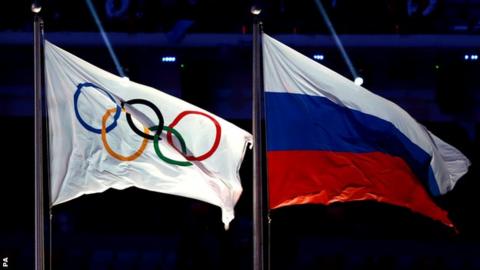
An overhaul of the World Anti-Doping Agency (Wada) has been proposed in a bid to restore trust in international sport.
The leaders of 17 national anti-doping organisations met at a special summit in Copenhagen this week.
The group says the fight for clean sport is now “at a crossroads”.
Damning reports into Russian state-sponsored doping, which led to a partial Rio Olympics ban, have shaken the anti-doping community.
The country has been given a blanket ban from competing at the Rio Paralympics, which start on 7 September.
Among the range of reforms agreed was a demand that Wada becomes more independent.
Under the proposals, Wada executives would not be be able to simultaneously hold a policy-making position within another sports organisation.
Wada president Sir Craig Reedie has been a vice-president of the International Olympic Committee (IOC), leading to criticism of a potential conflict of interest.
Background to the meeting
The IOC controversially resisted Wada’s call for Russia to be banned from this month’s Rio Games, but the saga deeply divided the Olympic community.
Most Russian track and field athletes were banned from competing, while all Russian competitors are barred from the Paralympics.
More than 100 are appealing against the International Paralympic Committee’s decision.
“We recognise we are at a crossroads in the fight for clean sport,” the leaders of the national anti-doping organisations (Nado) said in a joint statement.
“With the best interests of clean athletes at heart, we have come together to discuss reforms that we believe will better protect them, restore confidence in the global anti-doping effort that has been deeply damaged, and ensure that the disturbing events of recent years are not repeated.”
The news comes at a key moment in the fierce debate over the future of Wada, which is jointly funded by the IOC and governments.
The IOC has convened a meeting later this year to discuss changes to the anti-doping regime.
Its president Thomas Bach was critical of Wada’s handling of the Russia scandal, suggesting it should have acted quicker on evidence given to it.
Further proposals
- separate investigatory, testing and results management functions from sports organisations “to prevent the inherent conflict of interest that exists when a sports organisation is tasked with both promoting and policing itself”
- amendment of the Wada code including the adoption of clear sanctions for large-scale subversions of the anti-doping system “with strong deterrent effect”
- increased capacity for Wada to investigate and impose proportionate sanctions for code non-compliance
- a strengthened Wada through increased investment
The Nado leaders also backed calls for a public commitment from the IOC and Russia to assist in guaranteeing the safety, security and well-being of whistle-blowers Yuliya Stepanova and her husband Vitaly Stepanov, “without whom the state‐supported system of doping would likely never have been exposed”.
Athlete Stepanova, 30, is in hiding with her family and has said she “fears for her life”.
The proposals were written and endorsed by anti-doping leaders from Australia, Austria, Canada, Denmark, Finland, France, Germany, Ireland, Japan, Netherlands, New Zealand, Norway, Sweden, Singapore, Switzerland, United Kingdom, and the United States, as well as the Institute of National Anti-Doping Organizations (iNado).



